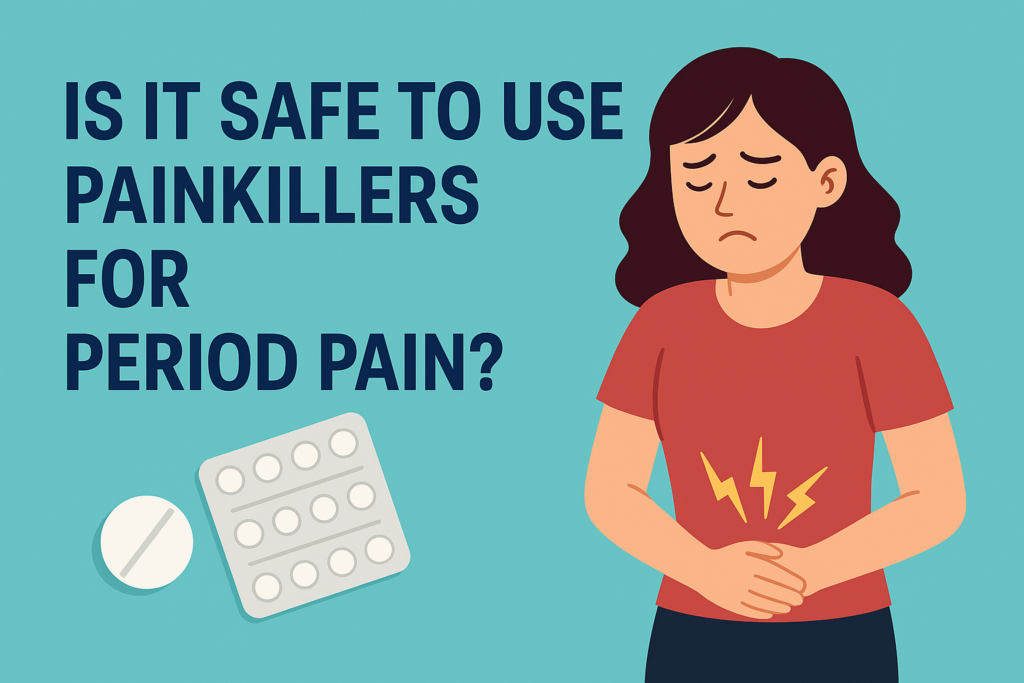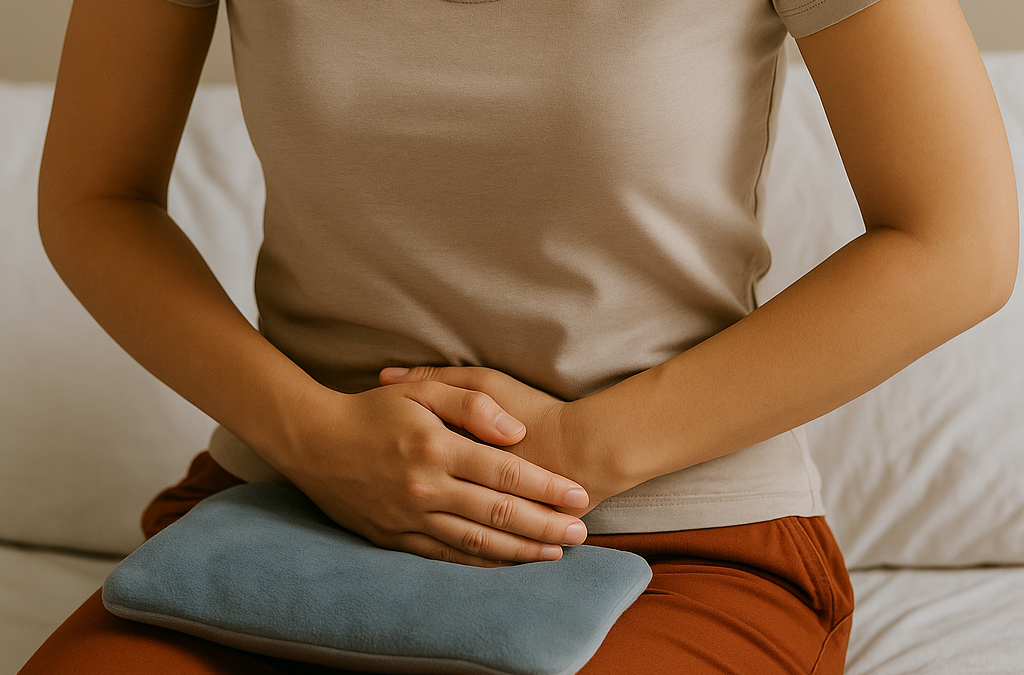Are painkillers for period pains the best solution, or is there more to managing menstrual cramps than just masking the discomfort?
Every month, countless women find themselves battling the familiar pain of menstrual cramps….whether it’s a dull, persistent ache or a sharp, stabbing sensation that spreads from the lower abdomen to the back and thighs.
For some, it’s just for few uncomfortable hours. For others, it’s a recurring nightmare that interrupts workdays, study sessions, family routines, and even sleep.
Reaching for a pack of ibuprofen, popping a paracetamol, or curling up with a hot water bottle has become second nature for many. A monthly ritual and a desperate attempt to alleviate the debilitating cramps, bloating, and fatigue that come with period pain.
And with good reasons
Research from the women’s health concern fact sheet reveals that around 80% of women experience some form of dysmenorrhea (the medical term for period pain), and more than 60% rely on painkillers to get through it.
Still, more women are starting to question their options. As concerns about the long-term use of painkillers for period pains grow, many are seeking safer alternatives to manage the pain. And this is driven by worries about potential side effects, dependency, and reduced effectiveness over time.
The desire for a healthier approach to menstrual health is driving the discovery of more natural, sustainable solutions. From exploring home remedies to embracing lifestyle changes, majority are taking charge of their well-being, testing different methods and seeking answers.
So, what actually works? Are over-the-counter painkillers safe when used regularly? And what alternatives exist for women seeking lasting relief?
This article brings together insights from top medical experts, backed by science, to help you understand the safest and most effective ways to manage menstrual pains.
From choosing the right painkiller to exploring holistic remedies and medical solutions, you’ll find the information you need below to take control of your period pain with confidence.
Now, let’s get started………
Is it Safe to use Painkillers for Period Pain?

When your period pain flares up, reaching for a painkiller can feel like the only way to get through the day. Medications like ibuprofen, naproxen, and paracetamol (acetaminophen) are household staples for this exact reason—they work quickly and are easy to access.
But how safe are they when used month after month?
According to Dr.Mary Jane Minkin a clinical professor of obstetrics and gynecology at Yale University, NSAIDs (nonsteroidal anti-inflammatory drugs) like ibuprofen and naproxen are generally safe for short-term use and are among the most effective options for relieving menstrual cramps. “NSAIDs reduce the production of prostaglandins—chemicals that trigger uterine contractions and pain,” she explains. “Taking them just before your period starts, or at the first sign of cramps, helps prevent the pain from escalating.”
Paracetamol, on the other hand, is a gentler alternative for those who have sensitive stomachs or cannot tolerate NSAIDs. It helps reduce pain and fever, although it may not reduce inflammation as effectively.
But, painkillers aren’t one-size-fits-all—and regular use comes with important considerations.
Dr. Jen_Gunter, OB-GYN and author of The Vagina Bible, notes that while NSAIDs are safe for most people, they can cause side effects if used too often or without proper guidance.
These risks include stomach irritation, ulcers, increased blood pressure, and potential kidney strain—especially in people with existing health conditions.
For example, women with ulcers, kidney disease, or heart issues should speak with a doctor before using NSAIDs regularly. Those who’ve had gastric bypass surgery are also advised to avoid them completely, as even a single dose could trigger complications.
The general rule is this….
.If you’re using painkillers every month, make sure you’re using them correctly and not masking a bigger issue. If the cramps keep getting worse, or if the medication barely makes a difference, it’s time to get evaluated for underlying conditions like endometriosis or adenomyosis, which often require more than just over-the-counter relief.
How to Use Painkillers Safely for Period Pain Relief
If you rely on painkillers to get through your monthly cramps, it is essential to understand the best practices for using them safely and effectively.
Period pain, medically known as primary dysmenorrhea, can interfere with daily life but that doesn’t mean you should suffer in silence or misuse medications.
Timing Is Everything
One of the most common mistakes people make is waiting until the pain is intense before taking a painkiller. However, starting treatment early—before or at the very first sign of cramping—can significantly reduce discomfort.
According to the Cleveland Clinic, NSAIDs like ibuprofen and naproxen are most effective when taken preemptively. They work by blocking prostaglandins, the hormone-like substances that cause inflammation and uterine contractions.
kecia Gaither, MD, MPH, MS, MBA, FACOG, a double board-certified OB/GYN and Maternal Fetal Medicine specialist, notes that painkillers are generally safe for short-term use, working by reducing inflammation to relieve pain.
Stick to Recommended Dosages
Over-the-counter NSAIDs are effective, but only when used correctly:
- Ibuprofen: 200–400 mg every 4–6 hours (max 1200 mg/day unless prescribed higher)
- Naproxen: 220 mg every 8–12 hours (max 660 mg/day OTC)
Do not exceed the maximum daily dose, and avoid using these medications for more than 3 consecutive days unless advised by a doctor. Prolonged or excessive use can lead to gastrointestinal bleeding, ulcers, liver damage, and kidney problems—especially in individuals with pre-existing conditions.
Avoid Dangerous Combinations
Never mix different NSAIDs (e.g., ibuprofen + naproxen), and avoid alcohol while taking painkillers. Combining painkillers with other medications or alcohol increases the risk of liver toxicity and gastrointestinal damage.
If you’re unsure what medications are safe to combine, consult a pharmacist or healthcare provider. For safer use, always read the label and patient information leaflet.
Are There Safer Alternatives to Painkillers for Period pains?
While NSAIDs and paracetamol can provide quick relief, many women are turning to natural remedies for period pain and drug-free menstrual cramp treatments. These options are especially valuable for those seeking long-term solutions with fewer side effects. They include the following:
1. Heat Therapy
Using a heating pad for menstrual cramps is one of the simplest and most effective home remedies. A warm compress or hot water bottle helps relax the muscles of the uterus, increase blood flow, and ease tension.
In fact, a randomized trial published in Evidence-Based Nursing found that heat wraps were just as effective as ibuprofen in relieving period cramps.
2. Exercise and Movement
Although working out might be the last thing you want to do, moderate physical activity helps release endorphins, which are natural painkillers for period pains.
Low-impact exercises like:
- Yoga
- Walking
- Stretching
- Swimming
…can significantly reduce pain severity and duration over time.
According to the journal of Physical Therapy Science, consistent physical activity decreases the intensity of primary dysmenorrhea.
3. Anti-Inflammatory Diet
What you eat can directly impact your pain levels. A diet high in processed foods, sugar, dairy, and red meat can increase inflammation and prostaglandin production—worsening cramps.
Instead, opt for a period pain relief diet rich in:
- Omega-3 fatty acids (e.g., salmon, chia seeds)
- Leafy greens (e.g., spinach, kale)
- Magnesium-rich foods (e.g., bananas, avocados, nuts)
- Herbal teas (e.g., ginger, chamomile, peppermint)
Ginger, in particular, has been shown to be as effective as NSAIDs in reducing menstrual pain in some studies.
When Is Period Pain a Sign of Something More Serious?
Severe period pain that doesn’t respond to over-the-counter treatments may be a sign of an underlying medical condition such as:
- Endometriosis
- Adenomyosis
- Uterine fibroids
- Pelvic inflammatory disease (PID)
- Ovarian cysts
If your period pain is progressively worsening, accompanied by heavy bleeding, or impacting your ability to function, consult a gynecologist.
Early diagnosis of reproductive health conditions can make a significant difference in treatment options and quality of life.
Red flags to watch for include:
- Cramping that begins before menstruation and lasts longer than usual
- Pain during bowel movements
- Severe bloating or pelvic pressure
- Irregular or extremely heavy periods
How to Take Control of Your Period Pain
Managing menstrual pain effectively involves more than just taking a pill. It’s about understanding your body, recognizing warning signs, and choosing safe, sustainable relief methods.
Key takeaways:
- Painkillers like ibuprofen and paracetamol are safe when used correctly and occasionally.
- Heat, exercise, and anti-inflammatory diets offer valuable alternatives with fewer risks.
- Persistent, severe cramps may signal a more serious condition that requires medical attention.
No one should feel powerless against their period.
With the right tools, knowledge, and support, you can take control of your menstrual health—safely and confidently.
Need Reliable Period Pain Relief? Turn to myMedicines
Whether you’re looking for trusted painkillers for period pains , healthcare medications, or expert guidance, myMedicines offers easy access to pharmacist-verified solutions delivered to you.
With so many options available, consulting experts can help you navigate the best painkillers for period pains, understand potential side effects, and explore alternative approaches like home remedies for period cramps or natural period pain relief methods.
By seeking advice, you can make informed decisions about your menstrual health and find effective ways to get relief from the pain.
Visit myMedicines for verified guidance and support to take control of your menstrual health and overall well-being.
With just a few clicks, you can:
- Shop for genuine medications
- Chat with a licensed pharmacist
- Explore affordable health care solutions like myAdvantage
When you have the right knowledge and support, you can take control of your menstrual health and say goodbye to period pain’s grip on your life.

 We use cookies to ensure that we give you the best experience on our website. If you continue to use this site we will assume that you are happy with it.
We use cookies to ensure that we give you the best experience on our website. If you continue to use this site we will assume that you are happy with it.